Unit 2 What time do you go to school Section A 2 (Grammar Focus-3c)同步优学案(含答案)
文档属性
| 名称 | Unit 2 What time do you go to school Section A 2 (Grammar Focus-3c)同步优学案(含答案) |
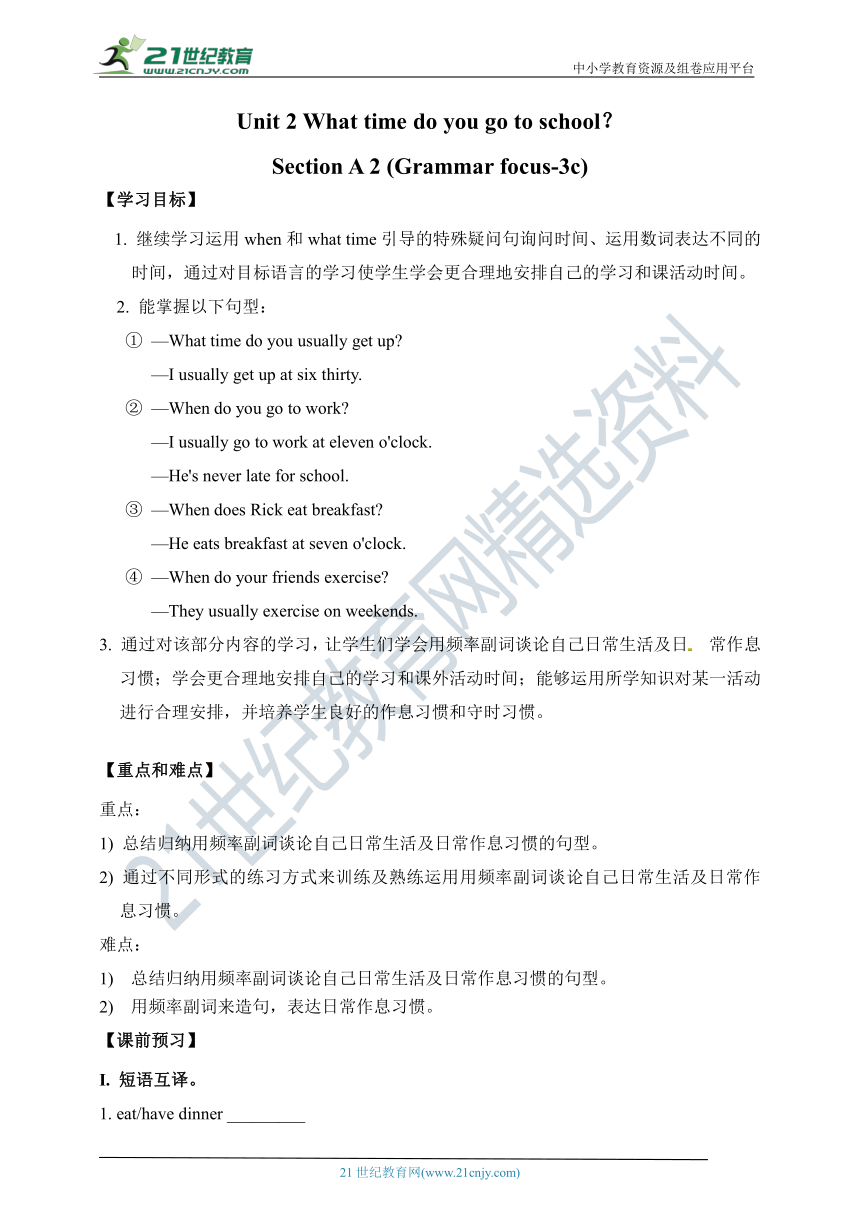
|
|
| 格式 | doc | ||
| 文件大小 | 1.3MB | ||
| 资源类型 | 试卷 | ||
| 版本资源 | 人教新目标(Go for it)版 | ||
| 科目 | 英语 | ||
| 更新时间 | 2021-02-19 00:00:00 | ||
图片预览

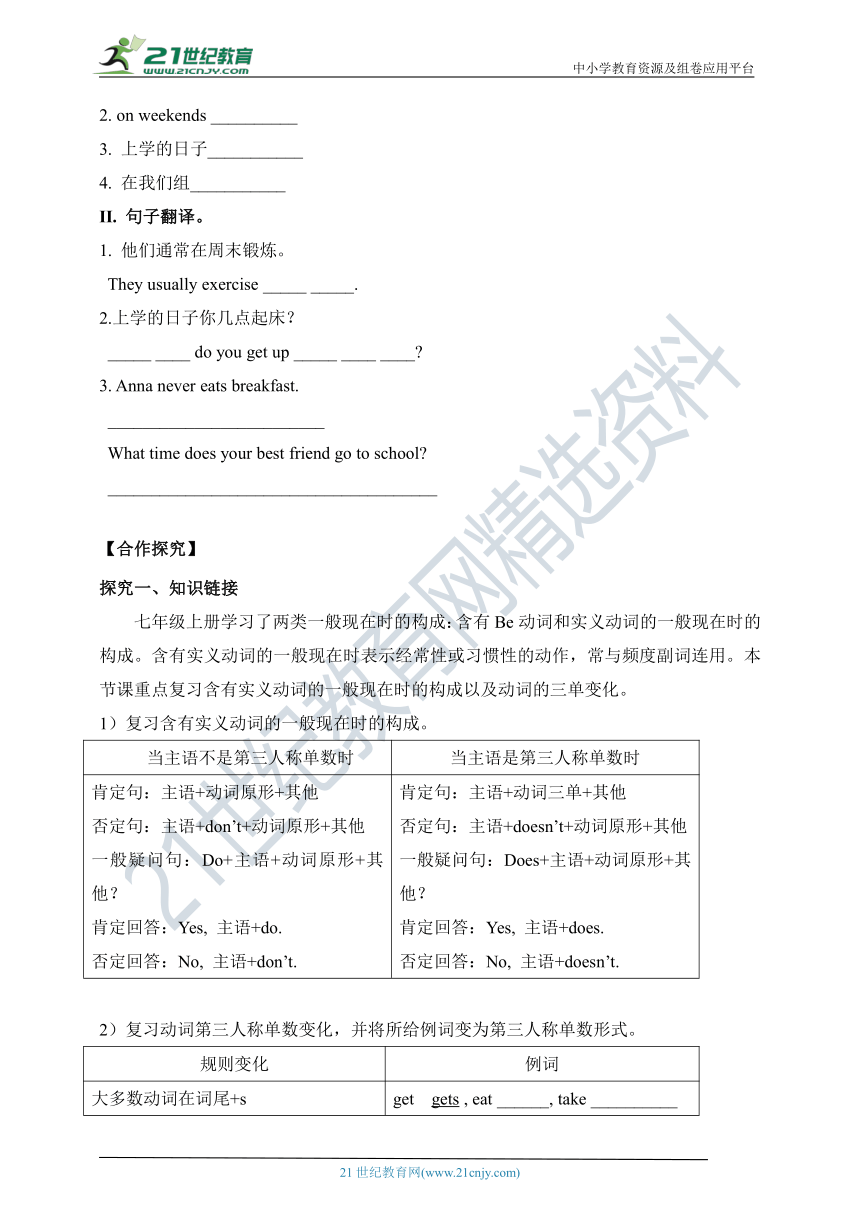
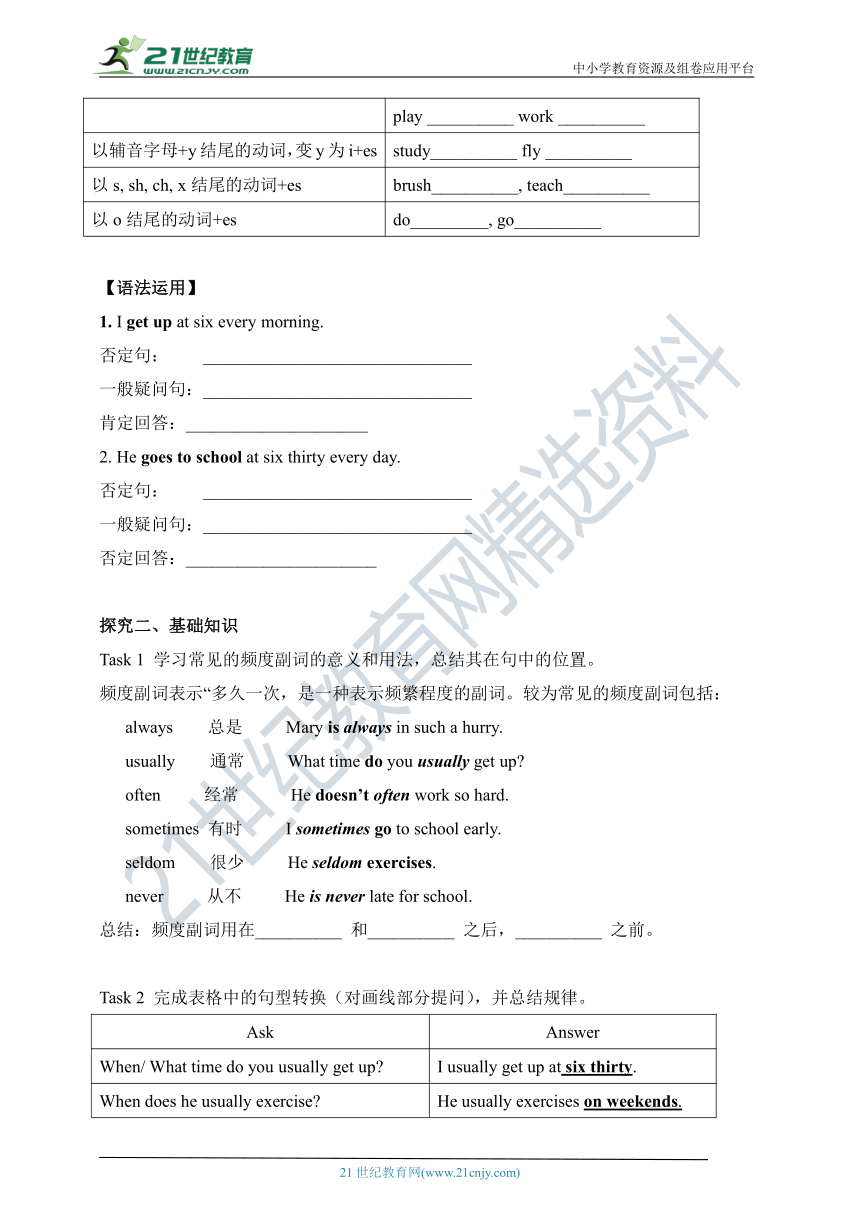
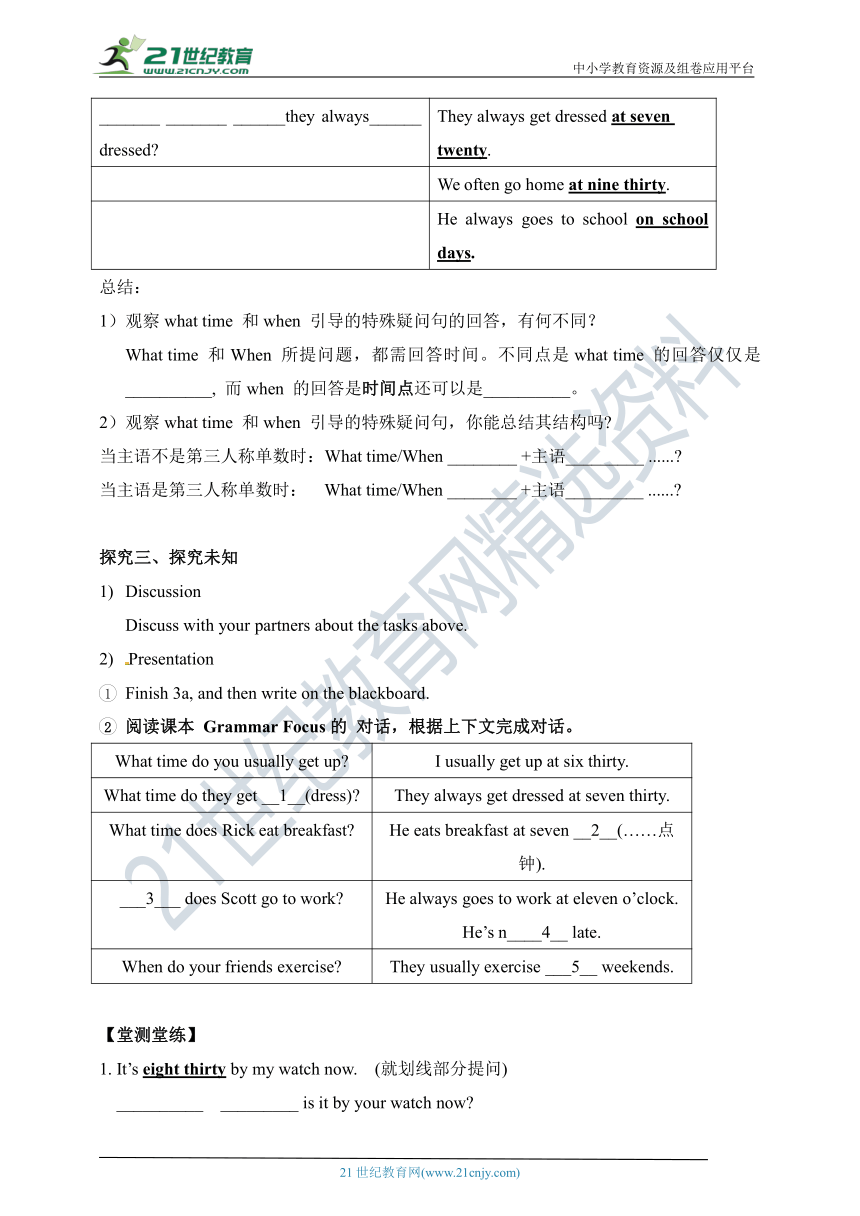
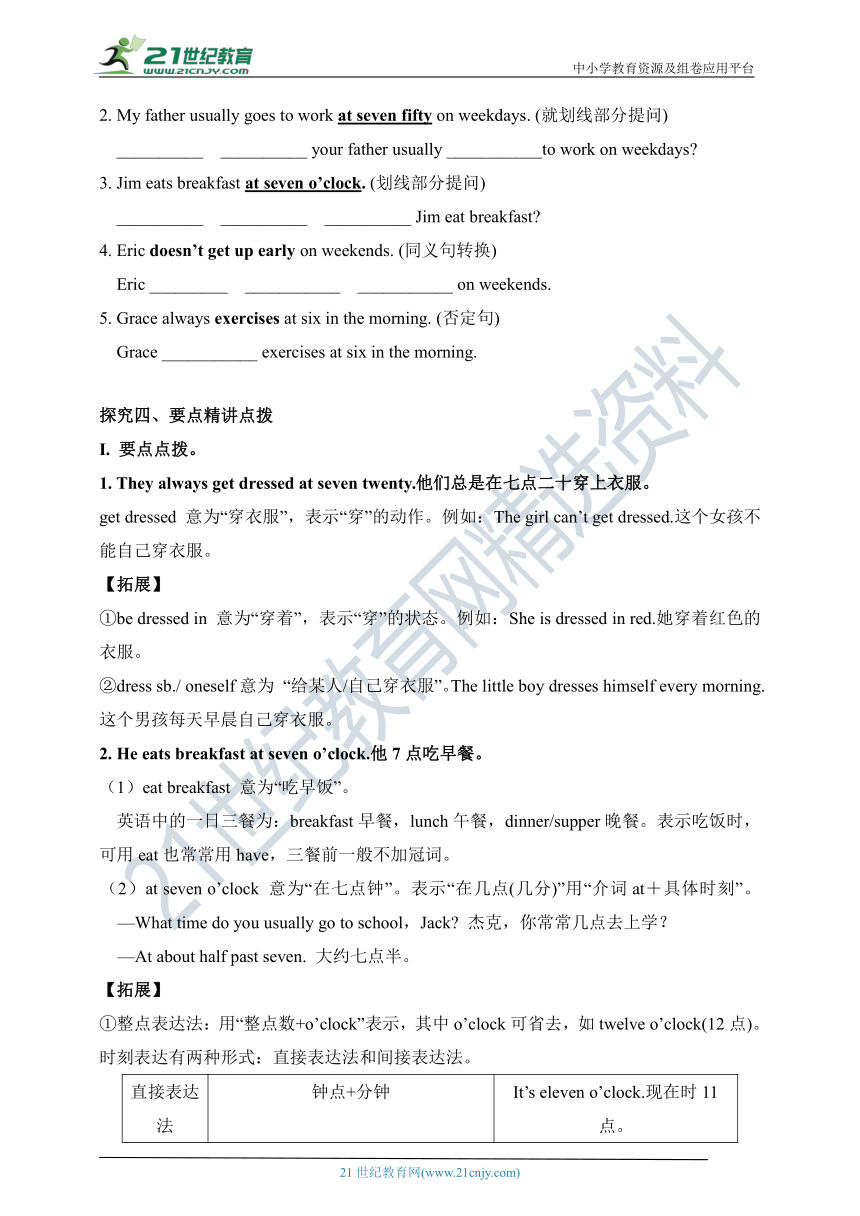
文档简介
中小学教育资源及组卷应用平台
Unit 2 What time do you go to school?
Section A 2 (Grammar focus-3c)
【学习目标】
继续学习运用when和what time引导的特殊疑问句询问时间、运用数词表达不同的时间,通过对目标语言的学习使学生学会更合理地安排自己的学习和课活动时间。
2. 能掌握以下句型:
① —What time do you usually get up?
—I usually get up at six thirty.
② —When do you go to work?
—I usually go to work at eleven o'clock.
—He's never late for school.
③ —When does Rick eat breakfast?
—He eats breakfast at seven o'clock.
④ —When do your friends exercise?
—They usually exercise on weekends.
3. 通过对该部分内容的学习,让学生们学会用频率副词谈论自己日常生活及日 常作息习惯;学会更合理地安排自己的学习和课外活动时间;能够运用所学知识对某一活动进行合理安排,并培养学生良好的作息习惯和守时习惯。
【重点和难点】
重点:
1) 总结归纳用频率副词谈论自己日常生活及日常作息习惯的句型。
2) 通过不同形式的练习方式来训练及熟练运用用频率副词谈论自己日常生活及日常作息习惯。
难点:
1) 总结归纳用频率副词谈论自己日常生活及日常作息习惯的句型。
2) 用频率副词来造句,表达日常作息习惯。
【课前预习】
I. 短语互译。
1. eat/have dinner _________
2. on weekends __________
3. 上学的日子___________
4. 在我们组___________
II. 句子翻译。
1. 他们通常在周末锻炼。
They usually exercise _____ _____.
2.上学的日子你几点起床?
_____ ____ do you get up _____ ____ ____?
3. Anna never eats breakfast.
_________________________
What time does your best friend go to school?
______________________________________
【合作探究】
探究一、知识链接
七年级上册学习了两类一般现在时的构成:含有Be动词和实义动词的一般现在时的构成。含有实义动词的一般现在时表示经常性或习惯性的动作,常与频度副词连用。本节课重点复习含有实义动词的一般现在时的构成以及动词的三单变化。
复习含有实义动词的一般现在时的构成。
当主语不是第三人称单数时 当主语是第三人称单数时
肯定句:主语+动词原形+其他 否定句:主语+don’t+动词原形+其他
一般疑问句:Do+主语+动词原形+其他?
肯定回答:Yes, 主语+do.
否定回答:No, 主语+don’t. 肯定句:主语+动词三单+其他
否定句:主语+doesn’t+动词原形+其他
一般疑问句:Does+主语+动词原形+其他?
肯定回答:Yes, 主语+does.
否定回答:No, 主语+doesn’t.
复习动词第三人称单数变化,并将所给例词变为第三人称单数形式。
规则变化 例词
大多数动词在词尾+s get gets , eat ______, take __________
play __________ work __________
以辅音字母+y结尾的动词,变y为i+es study__________ fly __________
以s, sh, ch, x结尾的动词+es brush__________, teach__________
以o结尾的动词+es do_________, go__________
【语法运用】
1. I get up at six every morning.
否定句: _______________________________
一般疑问句:_______________________________
肯定回答:_____________________
2. He goes to school at six thirty every day.
否定句: _______________________________
一般疑问句:_______________________________
否定回答:______________________
探究二、基础知识
Task 1 学习常见的频度副词的意义和用法,总结其在句中的位置。
频度副词表示“多久一次,是一种表示频繁程度的副词。较为常见的频度副词包括:
always 总是 Mary is always in such a hurry.
usually 通常 What time do you usually get up?
often 经常 He doesn’t often work so hard.
sometimes 有时 I sometimes go to school early.
seldom 很少 He seldom exercises.
never 从不 He is never late for school.
总结:频度副词用在__________ 和__________ 之后,__________ 之前。
Task 2 完成表格中的句型转换(对画线部分提问),并总结规律。
Ask Answer
When/ What time do you usually get up? I usually get up at six thirty.
When does he usually exercise? He usually exercises on weekends.
_______ _______ ______they always______ dressed? They always get dressed at seven twenty.
We often go home at nine thirty.
He always goes to school on school days.
总结:
观察what time 和when 引导的特殊疑问句的回答,有何不同?
What time 和When 所提问题,都需回答时间。不同点是what time 的回答仅仅是__________, 而when 的回答是时间点还可以是__________。
观察what time 和when 引导的特殊疑问句,你能总结其结构吗?
当主语不是第三人称单数时:What time/When ________ +主语_________ ......?
当主语是第三人称单数时: What time/When ________ +主语_________ ......?
探究三、探究未知
Discussion
Discuss with your partners about the tasks above.
Presentation
Finish 3a, and then write on the blackboard.
阅读课本 Grammar Focus的 对话,根据上下文完成对话。
What time do you usually get up? I usually get up at six thirty.
What time do they get __1__(dress)? They always get dressed at seven thirty.
What time does Rick eat breakfast? He eats breakfast at seven __2__(……点钟).
___3___ does Scott go to work? He always goes to work at eleven o’clock. He’s n____4__ late.
When do your friends exercise? They usually exercise ___5__ weekends.
【堂测堂练】
1. It’s eight thirty by my watch now. (就划线部分提问)
__________ _________ is it by your watch now?
2. My father usually goes to work at seven fifty on weekdays. (就划线部分提问)
__________ __________ your father usually ___________to work on weekdays?
3. Jim eats breakfast at seven o’clock. (划线部分提问)
__________ __________ __________ Jim eat breakfast?
4. Eric doesn’t get up early on weekends. (同义句转换)
Eric _________ ___________ ___________ on weekends.
5. Grace always exercises at six in the morning. (否定句)
Grace ___________ exercises at six in the morning.
探究四、要点精讲点拨
I. 要点点拨。
1. They always get dressed at seven twenty.他们总是在七点二十穿上衣服。
get dressed 意为“穿衣服”,表示“穿”的动作。例如:The girl can’t get dressed.这个女孩不能自己穿衣服。
【拓展】
①be dressed in 意为“穿着”,表示“穿”的状态。例如:She is dressed in red.她穿着红色的衣服。
②dress sb./ oneself意为 “给某人/自己穿衣服”。The little boy dresses himself every morning.这个男孩每天早晨自己穿衣服。
2. He eats breakfast at seven o’clock.他7点吃早餐。
(1)eat breakfast 意为“吃早饭”。
英语中的一日三餐为:breakfast早餐,lunch午餐,dinner/supper晚餐。表示吃饭时,可用eat也常常用have,三餐前一般不加冠词。
(2)at seven o’clock 意为“在七点钟”。表示“在几点(几分)”用“介词at+具体时刻”。 —What time do you usually go to school,Jack? 杰克,你常常几点去上学?
—At about half past seven. 大约七点半。
【拓展】
①整点表达法:用“整点数+o’clock”表示,其中o’clock可省去,如twelve o’clock(12点)。
时刻表达有两种形式:直接表达法和间接表达法。
直接表达法 钟点+分钟 It’s eleven o’clock.现在时11点。
It’s seven five.现在是7:05.
间接表达法 分钟+past/to+钟点 当分钟大于等于30分钟时用past,表示“过几分”。 five past nine=nine five=9:05
a quarter past ten=ten fifteen=10:15
half past two=two thirty=2:30
②介词at, in, on表示时间的用法:
at用于点时刻前,表示“几点几分”或一些固定的习惯用语中。例如:at nine o’clock在九点钟 at noon在中午
in用于月份、年份、季节前,也可表示在早上、下午或晚上。例如:in May在五月 in summer在夏季 in the morning在早上
on用于“在具体的日期”前。例如:on Monday在星期一
II. 趁热打铁。
1. Mary often gets up at 6:00 and ______.
A. get dress B. gets dressed C. get dressed D. gets dress
2. He _____ at seven o’clock.
A. have breakfast B. have a breakfast C. has breakfast D. has a breakfast
3. I get up______ 6:30 in the morning.
A. in B. at C. on D. to
【课时小结】
重点单词
best(adj.)最好的(adv.)最好地;最
group(n.)组;群
重点词组
go to work上班
on weekend s在周末
have/eat breakfast吃早餐
on school days在上学的日子
be late迟到
重点句式
1.—What time does Rick eat breakfast? Rick什么时候吃早餐?
—He eats breakfast at seven o’clock. 他七点钟吃早餐。
2.—When do your friends exercise? 你的朋友什么时候做运动?
—They usually exercise on weekends. 他们通常在周末做运动。
【达标检测】
Ⅰ.根据句意及首字母提示填写单词。
1.Mom usually gets up at 5:50 and then b________ her teeth.
2.Tom is never late and he is a________ early.
3.—What do you often do a________ school?
—I often play football with my friends.
4.—Who is your b________ friend?
—Maria.
5.There are four members in our g________.
Ⅱ.用括号内所给单词的适当形式填空。
6.What time ________your father ________(get)up on the weekend?
7.My sister usually ________(brush)her teeth first in the morning.
8.Kate always ________(go)to work at 6:30 in the morning.
9.I always get ________(dress)at six o'clock in the morning.
10.Ann never ________(play)computer games at school.
Ⅲ.单项选择。
( )11. Mike ________ the early morning news on TV.
A.watches B.sees C.looks at D.looks
( )12. Their favorite sport is football,and they ________ play it after school.
A.never B.too C.always D.very
( )13. Tony often ________ a shower after he gets up.
A.has B.takes C.by D.get
( )14. We can't play computer games ________ night.
A.in B.for C.with D.at
( )15. —________does Mary get up ________school days?
—At 7:00.
A.What time;on B.What time;in
C.What;on D.How;in
Ⅳ.按要求完成下列句子,每空一词。
16.Jane usually gets up at half past five in the morning.(对画线部分提问)
________ ________ ________ Jane usually ________up in the morning?
17.Mary's father works in a hospital.(改为一般疑问句)
________Mary's father _______in a hospital?
18.I usually exercise in the morning.(对画线部分提问)
________ ________ you usually exercise?
19.Alice always gets up early.(改为否定句)
Alice ________gets up early.
20.They often go to school at half past seven in the morning. (用he改写句子)
He often ________ ________ ________ at half past seven in the morning.
【教师寄语】
Time, Time again, I ask myself
【自我评价】
1. 本课我学会了什么?
_________________________________________________________________
2. 通过本课的学习,我还有哪些疑问?
_________________________________________________________________
参考答案:
【课前预习】
I. 短语互译。
1. 吃晚饭 2.(在)周末 3. on school days 4. in our group
II. 句子翻译。
1. on weekends 2. What time; on school days
3. 安娜从不吃早饭。 4.你最好的朋友几点去上学?
【合作探究】
探究一
规则变化 例词
大多数动词在词尾+s get-gets , eat-eats, take -takes
play –plays work -works
以辅音字母+y结尾的动词,变y为i+es study-studies fly-flies
以s, sh, ch, x结尾的动词+es brush-brush, teach-teaches
以o结尾的动词+es do-does, go-goes
【语法运用】
1. I don’t get up at six every morning
Do you get up at six every morning?
Yes, I do.
2. He doesn’t go to school at six thirty every day
Does he go to school at six thirty every day?
Yes, he does.
探究二
Task 1
总结:频度副词用在be动词和助动词之后,行为动词之前。
Task 2
Ask Answer
When/ What time do you usually get up? I usually get up at?six thirty.
When does he usually exercise? He usually exercises on weekends.
What time do they always get dressed? They always get dressed at seven twenty.
What time do you go home? We often go home at nine thirty.
What time does he go to school? He always goes to school on school days.
总结:
时间点;时间段
助动词do; 动词原形 助动词does; 动词原形
探究三
1. dressed 2.o’clock 3.When 4.never 5.on
【堂测堂练】
What time
When does; go
What time does
get up late
doesn’t
探究四BCB
【达标检测】
Ⅰ.1.brushes 2.always 3.after 4.best 5.group
Ⅱ.6.does;get 7.brushes 8.goes 9.dressed 10.plays
Ⅲ.11-15 ACBDA
Ⅳ.16. What time does;get 17. Does;work 18.When do
19. never 20. goes to school
_21?????????è?????(www.21cnjy.com)_
Unit 2 What time do you go to school?
Section A 2 (Grammar focus-3c)
【学习目标】
继续学习运用when和what time引导的特殊疑问句询问时间、运用数词表达不同的时间,通过对目标语言的学习使学生学会更合理地安排自己的学习和课活动时间。
2. 能掌握以下句型:
① —What time do you usually get up?
—I usually get up at six thirty.
② —When do you go to work?
—I usually go to work at eleven o'clock.
—He's never late for school.
③ —When does Rick eat breakfast?
—He eats breakfast at seven o'clock.
④ —When do your friends exercise?
—They usually exercise on weekends.
3. 通过对该部分内容的学习,让学生们学会用频率副词谈论自己日常生活及日 常作息习惯;学会更合理地安排自己的学习和课外活动时间;能够运用所学知识对某一活动进行合理安排,并培养学生良好的作息习惯和守时习惯。
【重点和难点】
重点:
1) 总结归纳用频率副词谈论自己日常生活及日常作息习惯的句型。
2) 通过不同形式的练习方式来训练及熟练运用用频率副词谈论自己日常生活及日常作息习惯。
难点:
1) 总结归纳用频率副词谈论自己日常生活及日常作息习惯的句型。
2) 用频率副词来造句,表达日常作息习惯。
【课前预习】
I. 短语互译。
1. eat/have dinner _________
2. on weekends __________
3. 上学的日子___________
4. 在我们组___________
II. 句子翻译。
1. 他们通常在周末锻炼。
They usually exercise _____ _____.
2.上学的日子你几点起床?
_____ ____ do you get up _____ ____ ____?
3. Anna never eats breakfast.
_________________________
What time does your best friend go to school?
______________________________________
【合作探究】
探究一、知识链接
七年级上册学习了两类一般现在时的构成:含有Be动词和实义动词的一般现在时的构成。含有实义动词的一般现在时表示经常性或习惯性的动作,常与频度副词连用。本节课重点复习含有实义动词的一般现在时的构成以及动词的三单变化。
复习含有实义动词的一般现在时的构成。
当主语不是第三人称单数时 当主语是第三人称单数时
肯定句:主语+动词原形+其他 否定句:主语+don’t+动词原形+其他
一般疑问句:Do+主语+动词原形+其他?
肯定回答:Yes, 主语+do.
否定回答:No, 主语+don’t. 肯定句:主语+动词三单+其他
否定句:主语+doesn’t+动词原形+其他
一般疑问句:Does+主语+动词原形+其他?
肯定回答:Yes, 主语+does.
否定回答:No, 主语+doesn’t.
复习动词第三人称单数变化,并将所给例词变为第三人称单数形式。
规则变化 例词
大多数动词在词尾+s get gets , eat ______, take __________
play __________ work __________
以辅音字母+y结尾的动词,变y为i+es study__________ fly __________
以s, sh, ch, x结尾的动词+es brush__________, teach__________
以o结尾的动词+es do_________, go__________
【语法运用】
1. I get up at six every morning.
否定句: _______________________________
一般疑问句:_______________________________
肯定回答:_____________________
2. He goes to school at six thirty every day.
否定句: _______________________________
一般疑问句:_______________________________
否定回答:______________________
探究二、基础知识
Task 1 学习常见的频度副词的意义和用法,总结其在句中的位置。
频度副词表示“多久一次,是一种表示频繁程度的副词。较为常见的频度副词包括:
always 总是 Mary is always in such a hurry.
usually 通常 What time do you usually get up?
often 经常 He doesn’t often work so hard.
sometimes 有时 I sometimes go to school early.
seldom 很少 He seldom exercises.
never 从不 He is never late for school.
总结:频度副词用在__________ 和__________ 之后,__________ 之前。
Task 2 完成表格中的句型转换(对画线部分提问),并总结规律。
Ask Answer
When/ What time do you usually get up? I usually get up at six thirty.
When does he usually exercise? He usually exercises on weekends.
_______ _______ ______they always______ dressed? They always get dressed at seven twenty.
We often go home at nine thirty.
He always goes to school on school days.
总结:
观察what time 和when 引导的特殊疑问句的回答,有何不同?
What time 和When 所提问题,都需回答时间。不同点是what time 的回答仅仅是__________, 而when 的回答是时间点还可以是__________。
观察what time 和when 引导的特殊疑问句,你能总结其结构吗?
当主语不是第三人称单数时:What time/When ________ +主语_________ ......?
当主语是第三人称单数时: What time/When ________ +主语_________ ......?
探究三、探究未知
Discussion
Discuss with your partners about the tasks above.
Presentation
Finish 3a, and then write on the blackboard.
阅读课本 Grammar Focus的 对话,根据上下文完成对话。
What time do you usually get up? I usually get up at six thirty.
What time do they get __1__(dress)? They always get dressed at seven thirty.
What time does Rick eat breakfast? He eats breakfast at seven __2__(……点钟).
___3___ does Scott go to work? He always goes to work at eleven o’clock. He’s n____4__ late.
When do your friends exercise? They usually exercise ___5__ weekends.
【堂测堂练】
1. It’s eight thirty by my watch now. (就划线部分提问)
__________ _________ is it by your watch now?
2. My father usually goes to work at seven fifty on weekdays. (就划线部分提问)
__________ __________ your father usually ___________to work on weekdays?
3. Jim eats breakfast at seven o’clock. (划线部分提问)
__________ __________ __________ Jim eat breakfast?
4. Eric doesn’t get up early on weekends. (同义句转换)
Eric _________ ___________ ___________ on weekends.
5. Grace always exercises at six in the morning. (否定句)
Grace ___________ exercises at six in the morning.
探究四、要点精讲点拨
I. 要点点拨。
1. They always get dressed at seven twenty.他们总是在七点二十穿上衣服。
get dressed 意为“穿衣服”,表示“穿”的动作。例如:The girl can’t get dressed.这个女孩不能自己穿衣服。
【拓展】
①be dressed in 意为“穿着”,表示“穿”的状态。例如:She is dressed in red.她穿着红色的衣服。
②dress sb./ oneself意为 “给某人/自己穿衣服”。The little boy dresses himself every morning.这个男孩每天早晨自己穿衣服。
2. He eats breakfast at seven o’clock.他7点吃早餐。
(1)eat breakfast 意为“吃早饭”。
英语中的一日三餐为:breakfast早餐,lunch午餐,dinner/supper晚餐。表示吃饭时,可用eat也常常用have,三餐前一般不加冠词。
(2)at seven o’clock 意为“在七点钟”。表示“在几点(几分)”用“介词at+具体时刻”。 —What time do you usually go to school,Jack? 杰克,你常常几点去上学?
—At about half past seven. 大约七点半。
【拓展】
①整点表达法:用“整点数+o’clock”表示,其中o’clock可省去,如twelve o’clock(12点)。
时刻表达有两种形式:直接表达法和间接表达法。
直接表达法 钟点+分钟 It’s eleven o’clock.现在时11点。
It’s seven five.现在是7:05.
间接表达法 分钟+past/to+钟点 当分钟大于等于30分钟时用past,表示“过几分”。 five past nine=nine five=9:05
a quarter past ten=ten fifteen=10:15
half past two=two thirty=2:30
②介词at, in, on表示时间的用法:
at用于点时刻前,表示“几点几分”或一些固定的习惯用语中。例如:at nine o’clock在九点钟 at noon在中午
in用于月份、年份、季节前,也可表示在早上、下午或晚上。例如:in May在五月 in summer在夏季 in the morning在早上
on用于“在具体的日期”前。例如:on Monday在星期一
II. 趁热打铁。
1. Mary often gets up at 6:00 and ______.
A. get dress B. gets dressed C. get dressed D. gets dress
2. He _____ at seven o’clock.
A. have breakfast B. have a breakfast C. has breakfast D. has a breakfast
3. I get up______ 6:30 in the morning.
A. in B. at C. on D. to
【课时小结】
重点单词
best(adj.)最好的(adv.)最好地;最
group(n.)组;群
重点词组
go to work上班
on weekend s在周末
have/eat breakfast吃早餐
on school days在上学的日子
be late迟到
重点句式
1.—What time does Rick eat breakfast? Rick什么时候吃早餐?
—He eats breakfast at seven o’clock. 他七点钟吃早餐。
2.—When do your friends exercise? 你的朋友什么时候做运动?
—They usually exercise on weekends. 他们通常在周末做运动。
【达标检测】
Ⅰ.根据句意及首字母提示填写单词。
1.Mom usually gets up at 5:50 and then b________ her teeth.
2.Tom is never late and he is a________ early.
3.—What do you often do a________ school?
—I often play football with my friends.
4.—Who is your b________ friend?
—Maria.
5.There are four members in our g________.
Ⅱ.用括号内所给单词的适当形式填空。
6.What time ________your father ________(get)up on the weekend?
7.My sister usually ________(brush)her teeth first in the morning.
8.Kate always ________(go)to work at 6:30 in the morning.
9.I always get ________(dress)at six o'clock in the morning.
10.Ann never ________(play)computer games at school.
Ⅲ.单项选择。
( )11. Mike ________ the early morning news on TV.
A.watches B.sees C.looks at D.looks
( )12. Their favorite sport is football,and they ________ play it after school.
A.never B.too C.always D.very
( )13. Tony often ________ a shower after he gets up.
A.has B.takes C.by D.get
( )14. We can't play computer games ________ night.
A.in B.for C.with D.at
( )15. —________does Mary get up ________school days?
—At 7:00.
A.What time;on B.What time;in
C.What;on D.How;in
Ⅳ.按要求完成下列句子,每空一词。
16.Jane usually gets up at half past five in the morning.(对画线部分提问)
________ ________ ________ Jane usually ________up in the morning?
17.Mary's father works in a hospital.(改为一般疑问句)
________Mary's father _______in a hospital?
18.I usually exercise in the morning.(对画线部分提问)
________ ________ you usually exercise?
19.Alice always gets up early.(改为否定句)
Alice ________gets up early.
20.They often go to school at half past seven in the morning. (用he改写句子)
He often ________ ________ ________ at half past seven in the morning.
【教师寄语】
Time, Time again, I ask myself
【自我评价】
1. 本课我学会了什么?
_________________________________________________________________
2. 通过本课的学习,我还有哪些疑问?
_________________________________________________________________
参考答案:
【课前预习】
I. 短语互译。
1. 吃晚饭 2.(在)周末 3. on school days 4. in our group
II. 句子翻译。
1. on weekends 2. What time; on school days
3. 安娜从不吃早饭。 4.你最好的朋友几点去上学?
【合作探究】
探究一
规则变化 例词
大多数动词在词尾+s get-gets , eat-eats, take -takes
play –plays work -works
以辅音字母+y结尾的动词,变y为i+es study-studies fly-flies
以s, sh, ch, x结尾的动词+es brush-brush, teach-teaches
以o结尾的动词+es do-does, go-goes
【语法运用】
1. I don’t get up at six every morning
Do you get up at six every morning?
Yes, I do.
2. He doesn’t go to school at six thirty every day
Does he go to school at six thirty every day?
Yes, he does.
探究二
Task 1
总结:频度副词用在be动词和助动词之后,行为动词之前。
Task 2
Ask Answer
When/ What time do you usually get up? I usually get up at?six thirty.
When does he usually exercise? He usually exercises on weekends.
What time do they always get dressed? They always get dressed at seven twenty.
What time do you go home? We often go home at nine thirty.
What time does he go to school? He always goes to school on school days.
总结:
时间点;时间段
助动词do; 动词原形 助动词does; 动词原形
探究三
1. dressed 2.o’clock 3.When 4.never 5.on
【堂测堂练】
What time
When does; go
What time does
get up late
doesn’t
探究四BCB
【达标检测】
Ⅰ.1.brushes 2.always 3.after 4.best 5.group
Ⅱ.6.does;get 7.brushes 8.goes 9.dressed 10.plays
Ⅲ.11-15 ACBDA
Ⅳ.16. What time does;get 17. Does;work 18.When do
19. never 20. goes to school
_21?????????è?????(www.21cnjy.com)_
同课章节目录
- Unit 1 Can you play the guitar?
- Section A
- Section B
- Unit 2 What time do you go to school?
- Section A
- Section B
- Unit 3 How do you get to school?
- Section A
- Section B
- Unit 4 Don't eat in class.
- Section A
- Section B
- Unit 5 Why do you like pandas?
- Section A
- Section B
- Unit 6 I'm watching TV.
- Section A
- Section B
- Review of Units 1-6
- Unit 7 It's raining!
- Section A
- Section B
- Unit 8 Is there a post office near here?
- Section A
- Section B
- Unit 9 What does he look like?
- Section A
- Section B
- Unit 10 I'd like some noodles.
- Section A
- Section B
- Unit 11 How was your school trip?
- Section A
- Section B
- Unit 12 What did you do last weekend?
- Section A
- Section B
